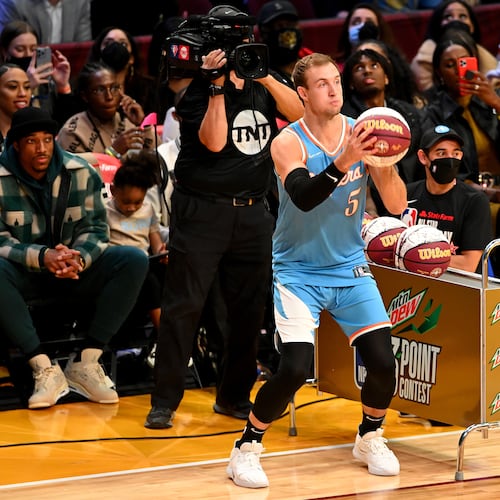The superstars in Miami and Dallas are deciding the NBA championship as the Hawks, a balanced collection of good players, are well into their summer break.
Neither development should be a surprise. In the chase for NBA titles, the elitism of star power almost always has trumped egalitarianism.
The NBA has crowned 61 champions since 1950. All but five of those teams placed at least one player on one of the top two All-NBA teams in the season they won it, and only 15 failed to have at least one player voted first team All-NBA (a third five-man All-NBA team was added starting with the 1988-89 season).
In fact, only 10 of the 61 finals runner-ups failed to have at least one player considered among the top 10 in the league. That means just 15 of 122 teams to make the finals — 12 percent — did so without a player considered among the league’s 10 best.
That trend will continue this postseason: Miami’s LeBron James was named first-team All-NBA and teammate Dwyane Wade and Dallas forward Dirk Nowitzki were voted to the second team.
No wonder Denver general manager Masai Ujiri said he lamented trading forward Carmelo Anthony in February. Anthony forced the move because he didn’t want to re-sign with Denver, and Ujiri was widely praised for acquiring good players in return while lacking leverage.
But Ujiri said the Nuggets “got killed” in the deal because they lost the 27-year-old Anthony, who was named second-team All-NBA in 2009-10.
The Hawks, meanwhile, have committed to trying to contend for a championship without a player of Anthony’s caliber.
“I don’t think we have an MVP candidate,” Hawks general manager Rick Sund said.
Hawks owners chafe at the perception that the team doesn’t spend money. Indeed, the Hawks had the league’s eighth-highest payroll this season, spending within about $500,000 of the luxury-tax threshold of $71 million.
But all of that cash hasn’t netted the Hawks a true superstar. That followed an era in which the Hawks failed to select such a player in the draft with the lottery picks that came from lots of losing.
“It is going to be very hard for us to get that MVP candidate unless you pick one or two [in the draft],” Sund said. “Or unless you happen to have ... free-agent money, to get one in free agency. It’s going to be tough, so we are going to have to do it the hard way.”
The Hawks could have plotted a course to free up free-agent money this summer. That strategy probably would have meant at least a temporary regression from their 53-victory season in 2009-10.
Instead, last summer Sund re-signed free agent Joe Johnson to the richest contract in the league, and the Hawks’ season still ended in the Eastern Conference semifinals for the third consecutive year. Johnson’s six-year, $123.7 million contract is the primary reason the Hawks aren’t projected to have salary-cap space until after the 2013-14 season.
Johnson was named third-team All-NBA in 2009-10, but didn’t earn a single All-NBA vote from media this season, his worst in Atlanta. Johnson turns 30 this month, so there’s a better chance he will continue to decline rather than regain his 2009-10 form.
“When I am seeing [Dallas guard] Jason Kidd and Nowitzki and [Wade] and all these people in their 30s, that [age] doesn’t bother me,” Sund said. “Joe has made [the second round] three straight times, so he’s done a pretty good job of being the best player on your club in terms of getting there. Now his challenge, and opportunity, is getting to that next round.”
Unlike Johnson, Kidd, Nowitzki and Wade have a long history of playing at an elite level. Johnson’s third-team selection was his first time voted that high. While Nowitzki has made the first or second teams nine times, Kidd six times and Wade five.
Sund said “time will tell” if any of the current Hawks players can reach that level. Center Al Horford seems to have the best chance since he was named third-team All-NBA this season and turns 25 on Friday.
Historically, teams have acquired elite players by drafting them with the high picks that come with losing or by making trades for lottery picks. But it also has happened through acquiring the assets necessary to make blockbuster trades for established superstars or clearing the books with the hopes of signing one in free agency.
The Hawks don’t have the draft picks or the financial flexibility. Trading for an elite player would almost certainly mean chipping away at the team’s talent base by sacrificing good players, similar to what New York had to do to get Anthony.
“Basically we have pretty much built it around [getting] as much talent as we possibly can, blend it around and have a team effort,” Sund said.
About the Author
Keep Reading
The Latest
Featured


